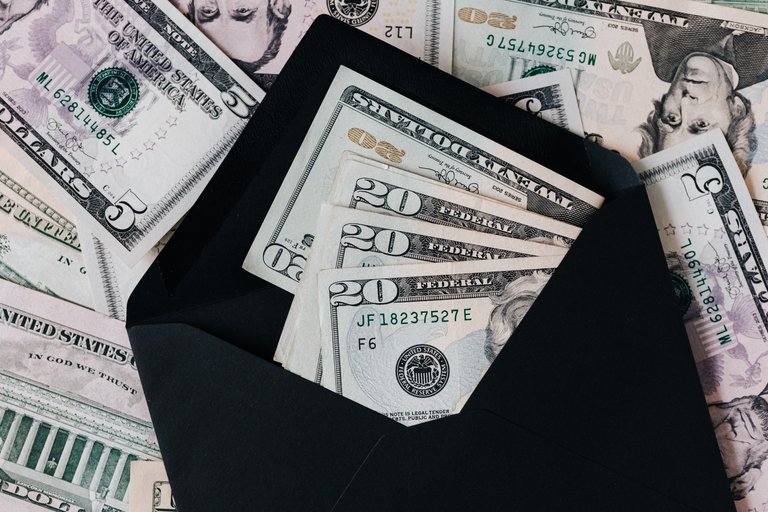Hello Hiveans!
Today, we will see together the eight laws of money to win the money game and achieve financial freedom. First, you need to know the rules. There are several money rules, but for this post, I chose the most important ones and put them all in one post. It’s like an accelerated course on money management. If you want to master the money game, this post will teach you everything you need to know about money.
So, let’s get started……
Who is the fastest self-made billionaire ever? While it took Warren Buffett 55 years to join the billionaires club, Jay Walker literally did it in less than a year. He launched priceline.com during the dot-com bubble, and his net worth instantly jumped from zero to billions. But that wasn’t sustainable because when the bubble burst, his net worth crashed as well, while Buffett is still on the top of the list, and he doesn’t seem to go anywhere anytime soon. That’s the kind of wealth you want to build. The money game is not easy; it’s tough, competitive, and ruthless. If you don’t know the rules, you’re doomed to failure. Some work hard all their lives but end up poor because they don’t understand how the game works. So, if you want to be on the opposite side, study the rules first. Allow me to present the six laws of money.
Rule No 1:
Money grows on trees. I’m sure many of you have been taught otherwise, but the fact is that if you don’t act in this manner, you’ll be impoverished for the rest of your life. You can’t spend your entire life exchanging time for money. You must plant trees that will provide income even when you’re not around. However, it is not as simple as it seems. You’re aware of how difficult it is to plant a tree. It is ineffective unless planted in nutrient-rich soil, and the tree will not develop on its own. You have to water and care for it, and it won’t grow overnight. Some trees can take 10, 20, or even 30 years to mature. But once they do, they will continue to produce fruit with little work. The same is true for assets. When you develop a business or save enough for a smart investment, it will continue to provide money even when you are not there.
Rule No 2:
There’s no limit to what you can spend. I remember when I lived paycheck to paycheck, I had an extremely limited budget. I figured if I made a bit more money, I’d start investing. However, when my income increased, I began to spend more. As you expand, your costs will rise, so discipline yourself to keep to a lower budget. Elon Musk survived on one dollar a day in the United States; surely, you can survive on a few hundred euros. Enjoy the money you make from your hard work, travel, and do anything you want, but keep your budget below your income.
Rule No 3:
Money is a lifelong game. When I first became serious about money and investing, I had this idea in my head that if I start making so and so, I won’t have to stay to a strict budget, and I’ll be able to retire and enjoy the rewards of my labor. But when I started making that much, I realized it wasn’t enough, and that I needed to produce more. In fact, if you stop managing it, it will stop generating income. Just because you purchased a house, you won't instantly find tenants. If you don’t take care of it, it may potentially become a liability. The concept of creating an asset and then doing nothing is absurd. Even if you build a successful business, you will have competitors who will try to take you down every single day. So forget about retiring one day. Of course, you may automate some of your tasks and reduce your working hours, but in general, this game will continue as long as you live. The world’s wealthiest people are a clear illustration of those who work even when they don’t have to.
Rule No 4:
Money won’t solve your insecurities. We all have insecurities, and a lot of times, we buy that expensive car or move to a bigger house or buy a newer phone because we want to be accepted or admired by society. That pricey automobile will make you happy for a week or two, but it will soon become normal. But your insecurity won’t go away, so you would want a better and more expensive car. It’s a never-ending loop that maintains wealthy people in power. If you want to find acceptance, learn how to better regulate your emotions. The truth is that your insecurities will drain down your bank account but will still stay there. Instead, work on improving your social skills and learning how to build your confidence. I’m not suggesting you buy an expensive automobile or a private plane; buy anything you want, but don’t do it to compensate for your discomfort. There are better and less expensive ways to accomplish this.
Rule No 5:
Don’t let anyone know that you have money. We love to brag about how much money we make. At the end of the day, that’s what determines your social position in the age of capitalism. Also, most people believe. But the trouble is that money attracts people. They will suddenly be friendly to you, and everyone will want a piece of it. Of course, it will make you feel good and respected, but that will come at a price that’s not worth it. And if they won’t be able to get it nicely, they will sue you and get it the hard way. That is the reality in which we live. Even if you make a million dollars every year, don’t tell anyone; stay humble, don’t brag about it, and keep making more.
Rule No 6:
Greatest wealth transfers happen during crises. When the economy crashed in 2008, the unemployment rate skyrocketed because the companies couldn’t keep paying the bills. Millions of individuals became unemployed, homeless, or impoverished. However, because the greatest transfers of wealth occurred during crises, some people actively began investing and were substantially wealthier following the crises. You may become an overnight success if you are willing to seize the chance. Remember Jay Walker from the beginning of the post who became a millionaire in less than a year by capitalizing on the dot-com bubble? Despite the fact that his fortune was not sustainable, he was able to keep hundreds of millions of dollars. Mark Cuban is another case in point. He even mentioned you were fortunate to become a billionaire since he would not be a billionaire if it hadn’t been for the 1998 financial crisis. Instead of looking at financial crises as a hoax created by the government or the one percent to rip off the poor, take advantage of it as they do. Understand how the system works, research previous crises to learn how and why they occur, and be prepared to be on the receiving end when the next one occurs.




